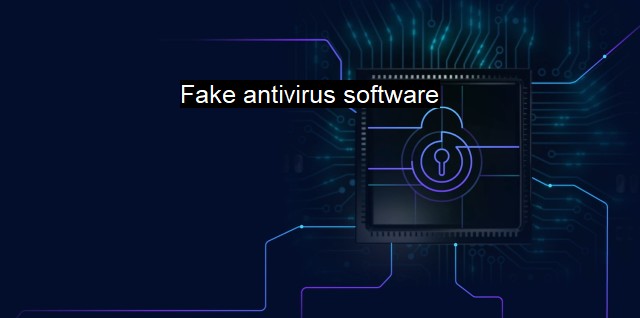What is Fake antivirus software?
The Dangers of Fake Antivirus Software: Deception, Malware, and Major Harm to Device and Personal Information
Fake antivirus software, also known as rogue antivirus software or "scareware," refers to malicious computer programs developed to simulate legitimate antivirus software. They often use deceptive tactics to deceive innocent computer users into paying to eliminate non-existing viruses or security dangers. They have become a major security issue with their degree of sophistication increasing every day.At a glance, fake antivirus software appears authentic. They leverage professional-looking graphical user interfaces that resemble those of reputable antivirus tools, boosting their disguise credibility. Also, they successfully copy the routines of legitimate software, even claiming to detect viruses, worms, and Trojans. these false infection reports, fraught with sophisticated jargon and visuals, aim to panic users into purchasing the full version of the program or a 'premium' suite purported to remove the found issues.
Fake antivirus software typically infiltrate systems through two primary channels. First, they utilize software vulnerabilities, especially in web browsers and their plugins. Phishing emails are another popular conduit, laden with hyperlinks that unsuspecting users click, unwittingly unleashing malicious programs onto their systems.
Deception is the core strategy used by fake antivirus software. They entice victims with free system scans that allegedly identify numerous threats. Upon conclusion, users are scared into buying solutions to remove these errors. In reality, it is nothing more than a ploy; the issues aren't real and neither are the solutions. Not to mention that purchasing these so-called solutions often also means disclosing vital financial information to nefarious individuals.
Further, the impact of fake antivirus software on systems goes beyond creating false alerts and cheating unsuspecting victims out of their hard-earned money. They also cause severe system slowdowns due to reduced processing power and Internet bandwidth, as they bombard the user with ceaseless alerts and run constant sham scans. they may carry other malicious payloads aimed at stealing sensitive data or turning your computer into a botnet for committing online infractions.
Detecting fake antivirus software can be challenging, given their deceptive nature. The unexpected presence of an antivirus tool that you did not install, frequent pestering infection alerts followed by high-pressure sales tactics to buy the removal tool, re-routed Internet connections to anticipated websites, and overall sluggish system performance are all possible signs of rogue antivirus software.
To protect computer systems from fake antivirus software, a multi-layered approach to cybersecurity is recommended. Always keeping operating systems and supporting software up-to-date is an excellent starting point in eliminating vulnerabilities. Install a reputable antivirus and malware detection application and ensure the definitions are updated regularly. Don't instinctively trust system alerts making you aware of virus detections, particularly infrequent ones that you've rarely experienced. Importantly, avoid clicking on links found in emails from unknown sources or visiting unverified websites—which are common gateways.
Between the false alarm fatigue caused by incessant faux virus alerts and the possible financial loss that may result from bogus premium software purchases as well as potential identity theft, fake antivirus software offers considerable distress to computer users. It leverages panic and naivety, manipulating people to act without critical examination.
While the primary threat might seem monetary, it goes far beyond that—fake antivirus software is an instrument for assorted malware types that expose your system to endless risks. These threats are not imagined but factual, causing damage not only to naive users, but to businesses and various institutions alike. As such, it becomes even more critical to stay informed about their machinations, prominently bearing the adage, "knowledge is power". The ultimate protection, as always, is prevention. Staying educated on the tactics employed, cultivating wise Internet habits, and having reliable security systems ensure that cybersecurity is not compromised.

Fake antivirus software FAQs
What is fake antivirus software?
Fake antivirus software, also known as rogue antivirus software or scareware, is a type of malware that disguises itself as legitimate antivirus software. It tricks users into paying for a fake subscription or downloading more malware onto their computer.How does fake antivirus software infect a computer system?
Fake antivirus software can infect a computer system through various methods, such as downloading infected software or files, clicking on malicious links, or opening infected email attachments.What are the signs of a fake antivirus software?
One of the signs of a fake antivirus software is receiving warning messages that your computer is infected with a virus, even if you have a legitimate antivirus software installed. Additionally, fake antivirus software may prompt users to download or purchase additional software, often accompanied by a sense of urgency or panic.How can I protect myself from fake antivirus software?
To protect yourself from fake antivirus software, be cautious when downloading software, updates, or files from untrusted sources. Use a reputable antivirus software and keep it updated. Avoid clicking on suspicious links or pop-ups, and do not download attachments from unknown senders.| | A | | | B | | | C | | | D | | | E | | | F | | | G | | | H | | | I | | | J | | | K | | | L | | | M | |
| | N | | | O | | | P | | | Q | | | R | | | S | | | T | | | U | | | V | | | W | | | X | | | Y | | | Z | |
| | 1 | | | 2 | | | 3 | | | 4 | | | 7 | | | 8 | | |||||||